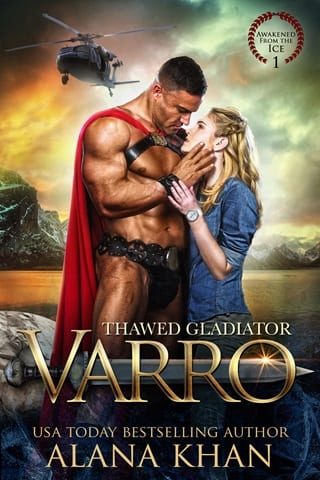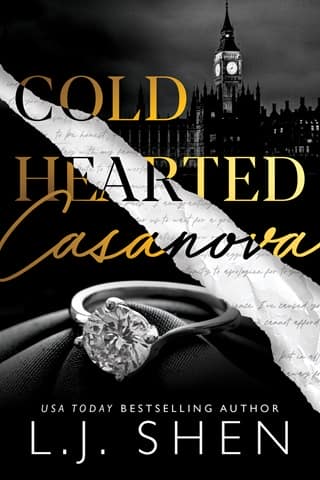3. Chapter Three
Chapter Three
M arcus Fabius Varro
Cold. So cold. The chill seeps into my bones, my veins, my very soul. I drift in hazy dreams, my thoughts scattered and fragmented like shards of ice.
Memories flicker through my mind, brief flashes of a life I can barely grasp. I see my father’s face, weathered and kind, his eyes crinkling at the corners as he smiles at me. My mother’s gentle hands, calloused, sometimes bloody from years of hard work, were always ready to soothe my fears.
Although every part of my body is in pain, my heart lightens when I remember the sound of my sisters’ laughter as we ran across the rolling hills of Hispania. We chased each other through the tall grass, our bare feet pounding against the earth. How long has it been since my heart was that light and free?
But life wasn’t always easy. The sun beat down upon our backs as we worked the fields, digging in the dirt as we coaxed meager crops from the stubborn soil. My father’s brow would furrow with worry as he counted our dwindling supplies, wondering how he would feed his family through the dormant season.
How odd that the worst moments of my childhood beckon me as though they were the best of times. I had no idea that the tragedies of my youth would turn out to be bright spots when I looked back on them as an adult.
Those hardships were always buffered by love. My mother would gather us around the hearth at night, her voice soft and melodic as she spun tales of the gods and heroes of old. My sisters and I would listen with rapt attention, our eyes wide with wonder as we were told of great sailing ships and giant birds, creatures from the depths of the oceans, and magical palaces above the clouds.
A sickly smell accompanies the memory of the time my youngest sister fell ill, her small body wracked with fever and chills. My mother never left her side, her hands soothing as she bathed her brow and whispered reassuring words. My father searched the hills for healing herbs, his steps heavy with worry.
We all prayed to the gods, especially Fortuna, the goddess of good fortune, our voices rising in a desperate plea for mercy. And somehow, miraculously, Livia survived. I recall the tears of relief that streamed down my mother’s face as my sister opened her eyes, her fever broken at last.
Those warm connections sustained us. The moments of love and togetherness shone like a beacon in the darkest times of our lives.
But danger was never far away. I was twelve when my father’s heavy step crossed the threshold of our home after a trip to the village. My country, Hispania, was a Roman province. It had been for generations, but a man my father called a hothead, Argantonius, had been inciting the men in the village to rise up against the Romans, to fight to claim our country back.
Father’s face was drawn, his forehead lined with worry as he reported that whispers were circulating, rumors that the great Roman army was marching toward our village to quell the unrest. There was a small Roman garrison in town. I’d taken pains to steer clear of them, avoid any notice of the men with their gleaming armor and cruel, cold eyes.
My father told my sisters to fetch water. When they were out of the house, his face grew even more grave, his hands clenching into fists as he spoke of the rumors—atrocities the Romans had committed in nearby villages. My mother held us close, her voice trembling as she prayed for protection. Father didn’t pray. Instead, he said, “If they come, I’ll grab the pitchfork. Varro, you take the scythe. Lucilla, take the girls and run to the north. Son, do whatever you can to protect your mother and sisters.”
And then, on a day that began like any other, they came. The sound of their marching feet was like thunder, shaking the very earth beneath our feet. Screams rent the air as they descended upon our village, their swords flashing in the sunlight.
I remember the chaos, the terror, the smell of smoke and blood. When it was clear our pitchfork and scythe were nothing against the force of the Roman army, my father shouted for us to run, his voice hoarse with desperation. My chest clenches tight as I still hear the echoes of my mother’s screams when a Roman soldier grabbed her, his hands rough and cruel.
My lungs burned as I ran, my heart nearly exploding in my chest as I carried Livia, the youngest of the three of us. All these years later, I can feel the searing pain as a soldier’s blade sliced my arm, the blood flowing hot and thick—even though the rest of me is cold, so cold.
And then there was darkness. A blow to the head, a sudden, wrenching blackness that swallowed me whole.
When I awoke, I was in chains, my wrists and ankles bound by unforgiving metal. There was a dirty rag tied around my arm, soaked with my blood. The stench of fear and despair hung heavy in the air as I huddled with the other captives, our eyes hollow with grief and terror.
I learned later that almost everyone in my village had been slaughtered, their bodies left to rot in the sun. My father, my mother, my sisters… all gone. Only a handful of us had been spared, taken as slaves to serve the Roman Empire.
But even in that moment of utter desolation, I clung to the memories of my family, to the love and warmth that had once filled my life. Those memories were all I had left, the only thing that could sustain me through the long, dark years to come .
As the cold seeps deeper into my bones, as the twilight of my slumber closes in around me, I hold fast to those memories, to the love that even death cannot erase. And somehow, impossibly, I find the strength to endure.
For I am Varro, son of Hispania, beloved child and brother. And not even the cruelty of Rome can take that from me.
 Fullepub
Fullepub 



